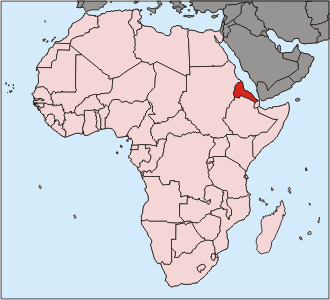By Bob Allen
The United Nations recently issued a scathing report on human rights in the northeast African nation of Eritrea researched with input from the Baptist World Alliance.
A June 4 report by the U.N. Human Rights Council found systemic and widespread human rights violations carried out under authority of the government, some of which may constitute crimes against humanity.
Based on 550 confidential interviews with victims and witnesses and various reports by non-governmental organizations, the U.N. report cites a 2013 paper by Elijah Brown, a member of the BWA Commission on Religious Freedom.
 Brown, at the time was a professor at East Texas Baptist University and now chief of staff of 21st Century Wilberforce Initiative, a Christian human-rights organization led by former Baptist General Convention of Texas Executive Director Randel Everett, collected testimonies in visits to refugee camps in Ethiopia populated by Eritreans fleeing the country for reasons including religious persecution.
Brown, at the time was a professor at East Texas Baptist University and now chief of staff of 21st Century Wilberforce Initiative, a Christian human-rights organization led by former Baptist General Convention of Texas Executive Director Randel Everett, collected testimonies in visits to refugee camps in Ethiopia populated by Eritreans fleeing the country for reasons including religious persecution.
In his report titled Eritrea: Twenty Years of Ongoing Repression, Brown said there are between 2,000 and 3,000 religious prisoners in Eritrea, most of them evangelical Christians.
“These religious prisoners are frequently beaten and tortured, prohibited from praying or singing aloud, and denied access to religious books,” Brown wrote. They are imprisoned in deplorable conditions, he said, and routinely are forced to recant their faith in order to be released or escape torture.
The 484-page U.N. report says Eritrea’s government perceives religion as a threat to its existence and has set about controlling its expression. Four religious denominations are authorized in Eritrea: Eritrean Orthodox, Catholicism, the Lutheran church and Sunni Islam.
 Jehovah’s Witnesses have been singled out since Eritrea’s 1993 declaration of independence because of their conscientious objection to the country’s military draft. Unregistered churches are banned, and individuals, including minors, have been arrested or rounded-up at social events because of their religious beliefs.
Jehovah’s Witnesses have been singled out since Eritrea’s 1993 declaration of independence because of their conscientious objection to the country’s military draft. Unregistered churches are banned, and individuals, including minors, have been arrested or rounded-up at social events because of their religious beliefs.
In order to practice their religions, many choose to leave the country, contributing to Eritrea’s designation as one of the largest refugee-producing countries in the world and earning it the nickname of “the North Korea of Africa.”
The U.S. State Department lists Eritrea as a country of “particular concern” regarding religious freedom violations, and the country receives no development, humanitarian or military aid from the United States.
A top Eritrean diplomat told Reuters that human traffickers, not the government, are behind Eritrea’s refugee problem and termed the U.N. report part of an international conspiracy to “tarnish” the country because of a border dispute with Ethiopia.
Randel Everett, founding president of the John Leland Center for Theological Studies in Virginia who served as BGCT executive director from 2008 until 2010, retired last year as pastor of First Baptist Church in Midland, Texas, to lead a new endeavor called the 21st Century Wilberforce Initiative to advocate for religious liberty around the world.
Other leaders include Congressman Frank Wolf, author of the International Religious Freedom Act; Jim Denison, founder of the Denison Forum on Truth and Culture; and Timothy George, founding dean of Beeson Divinity School.
